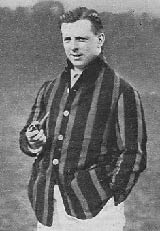
|

A rough sea but a calm pilot: how The Cricketer viewed Johnny Douglas at the start of the summer. But within two Tests he had been sacked as England's captain
© The Cricketer
|
|
In the last 16 years England have called on no end of players in a bid to check Australia's relentless domination in Ashes series. Some gambles have paid off, many more haven't. The list of one or two-Test wonders continues to grow, although the current selection strategy should provide more consistency and less chopping and changing.
But it was always the case. In the early days of Test cricket the sides were picked by the county hosting the match so some rather odd choices, ones based on local favouritism, were not unknown. And even when national selectors were appointed, the ability to raise eyebrows remained. In 1909, no fewer than 25 players were picked by England for the five-match series, and Wisden was moved to report that the selectors "touched on the confines of lunacy" with their side for the final Test at The Oval.
In 1921 things were equally shambolic. England had just been whitewashed 5-0 Down Under and, in the return series, Australia, under the leadership of the formidable Warwick Armstrong, were equally dominant. In the face of another drubbing, England's selectors abandoned consistency in a bid to find a quick fix. Suffice to say, that strategy failed, too.
England's selectors included two stars of the Golden Age - Reggie Spooner and Harry Foster - and John Daniell, Somerset's rather eccentric captain and a former England rugby international. Once Australia had blown England away at Trent Bridge inside two days, mainly courtesy of their fast bowlers Jack Gregory and Ted MacDonald, panic set in. By all accounts, both bowlers were fearsome, but a number of the England side were reported to have been seen backing to leg.
For the second Test at Lord's England made six changes, causing Johnny Douglas, their shell-shocked captain, to ask: "What is this damnable side of pic-nickers they have sent me?" Australia won by lunch on day three.
For the third Test, the selectors ditched the captain, brought in the Hon. Lionel Tennyson, and retained only four of the XI who played at Lord's. Alas, the outcome was the same, although England could point to some bad luck with Tennyson splitting the webbing between his thumb and forefinger early on and Jack Hobbs being rushed to hospital with appendicitis.
Rain ended Australia's eight-match winning sequence as the fourth Test at Old Trafford was drawn, although England were in the box seat for the first time that series. The final Test at The Oval suffered the same fate, partially because of the weather and partially because of Armstrong's unwillingness to resume after interruptions or to attack with either bat or ball. It was during that match that the legend was born that Armstrong picked up and read a newspaper blowing across the outfield because he "wanted to see who we were playing" - a reference to England's selectorial inconsistency. Sadly, the myth was untrue: while he did pick up the paper, he merely looked at some pictures and then tossed it aside.

|

Lionel Tennyson: called in to save England from a second whitewash
© The Cricketer
|
|
No fewer than seven of those who made their debut for England that summer never played again. And, while some were clearly out of their depth, others were not.
Charlie Parker, one of the game's most successful bowlers, returned 32-16-32-2 in the rain-affected Manchester Test but was never picked again. That possibly owed more to his left-wing leanings and irascible temperament than his ability.
But Johnny Evans, who was 32 when picked for the Lord's Test, made 4 and 14 and, according to contemporary reports, facing Gregory and McDonald he was "so nervous that his knees were knocking together ... his nerve had gone and the first straight ball did for him." Evans was no coward either, having won the Military Cross and Bar in the Great War.
Andy Ducat, who played football for England, thought that his call-up for the third Test was a prank. He was 35, and made only 3 and 2. His first innings ended when McDonald shattered his bat, with the ball flying to Gregory in the slips and a lump of broken wood clattering into his stumps.
As always, the selectors were in the firing line for the drubbing, but in The Cricketer, Pelham Warner wrote that "while no selection committee has ever been infallible in its judgment, or ever will be, I am of the opinion that our defeats were caused by one fact, namely, we met a better side."
While it is undeniable the better side won, the knee-jerk reaction to defeat, especially early in the series, hardly helped England's cause.
Bibliography
The Big Ship - Gideon Haigh (Aurum 2001)
The Cricketer Various 1921
Wisden 1922
&
Martin Williamson is managing editor of Cricinfo

